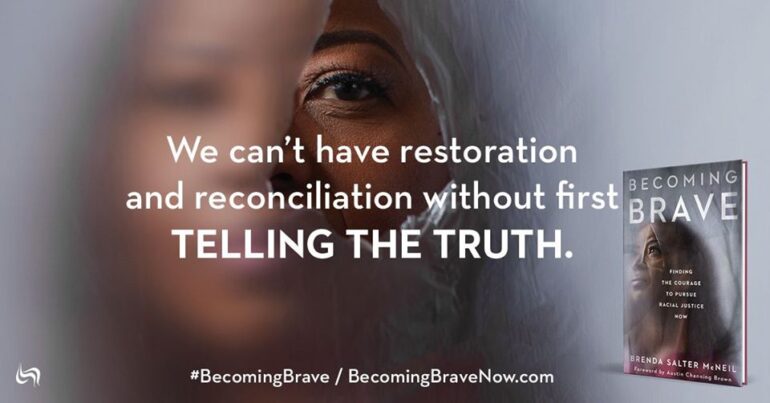My friend Brenda Salter-McNeil has a new book being released so I asked her to give us a sneak preview. Trust me when I say you will want to read this one. Brenda writes with passion and transparency while always keeping truth at the center of her message.
Sometimes her words are challenging. They push me to see things through her heart and to understand life from the perspective of an African-American woman. That has not always been comfortable for me, but it has always been a way to grow and learn. And, ultimately, to better understand how to love others.
Thank you, Brenda, for being a friend and guide.
Here, now, is an excerpt adapted from her book Becoming Brave.
Becoming Brave
“Dr. Brenda, when are you gonna talk about justice?”
It was the last day of a multiday workshop on racial reconciliation when a young African American seminary student asked me this question. I thought to myself, Didn’t I just spend several days talking about justice? I had been doing this work for over thirty years. What else could I possibly do?
As we talked afterward, he explained that he didn’t believe I had gone far enough in addressing issues of systemic and structural injustice. I had difficulty responding to his question because, frankly, I thought that I already had. In my mind, my entire life’s work had been talking about justice. If I hadn’t been talking about justice, then what had I been talking about exactly?!
The thing about a good question is that it not only makes you look within; it also makes you look around. As I continued to reflect on that young grad student’s question, I also reflected deeply on the ways the world was changing. Battles that we thought had been fought and won long ago are resurfacing. Rights we once thought secure are now in jeopardy.
Now more than ever, those who care about the reconciliation command of the Cross must speak up about injustice and must go about the work of dismantling the structures of this injustice. The Church must talk about justice. I must talk about justice. The time is now.
To understand my evolution as a reconciliation leader, you must first understand that I began my journey sincerely believing that if I could convince evangelical Christians that reconciliation was not some politically motivated agenda but a biblical calling rooted in Scripture, they would pursue racial justice. For years I tried to be biblical enough, nonthreatening enough, patient enough, persuasive enough, theologically rigorous enough, so that no one could say I had a hidden motive or agenda.
That’s what my ministry was about for a very long time. I preached the good news of diversity and multiculturalism at churches and conferences. I led workshops and taught seminars and told people about inclusion and equity and how Jesus demonstrated these principles in his ministry. But along the way, there were indicators that my approach, while good and well-intentioned, was not effecting the type of change I knew in my heart needed to take place.
So now, another question has emerged: What am I going to do about it? The answer is clear in my spirit, but not easy. I decided to become brave—to say the things that I must say and to stand for the truth, regardless of the consequences.
My reconciliation work has been deeply concerned with how my message will be received by white people. I made my message easy for them to hear. But no more. I have come to realize that I was used by white-dominant culture, probably unconsciously, to make the conversation about racial reconciliation more palatable to them.
But in the aftermath of the 2016 presidential election and the white supremacy that has evidenced itself in insidious and subtle ways, I made up my mind that I can no longer be used in this way. I will no longer preach, teach, or lead reconciliation on white-dominant culture’s terms.
Instead, I choose to affirm that my truth, my spirituality, and my identity are rooted in the Black community that raised me, nurtured me, and taught me to fight for a better world where all people can thrive. I am anchored and compelled by this faith that understands what it is to seek justice, equality, and peace.
Now, more than ever, we must all respond to the call of justice. Answering this call requires bravery, which is courage that is developed over time, because I am convinced that we can no longer preach Jesus without justice. This is what that young man in my seminar was asking me. He wanted to know whether the reconciliation I was preaching required social action rooted in a commitment to justice. And now I know the answer is a resounding “Yes!”
Excerpt adapted from Becoming Brave: Find the Courage to Pursue Racial Justice Now by Brenda Salter McNeil. © 2020 by Brenda Salter McNeil. Published by Brazos Press. Used by permission.

